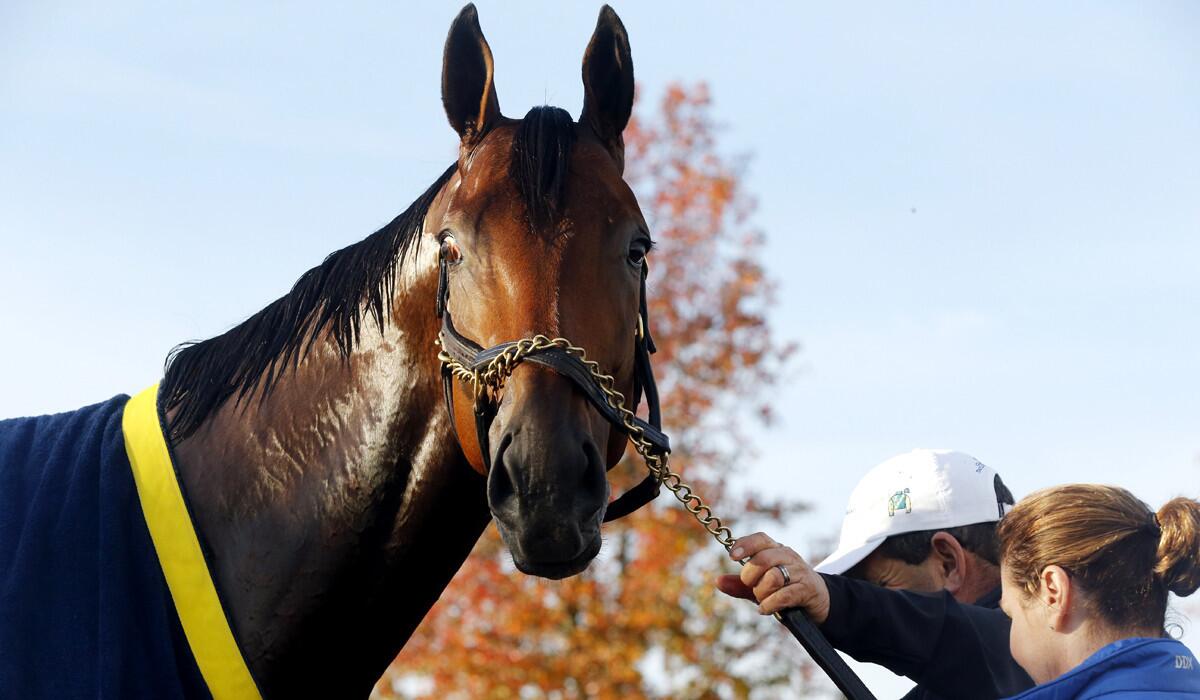Column: American Pharoah can finish in style

Triple Crown winner American Pharoah is tended to after a workout at Keeneland race track on Thursday.
- Share via
From Lexington, Ky. — History will have to carry the day in the Breeders’ Cup on Saturday. What was hoped to be a showdown is now more of a show.
Triple Crown winner American Pharoah will not have magnificent mare Beholder to share the spotlight in the $5-million Classic, nor to boost the drama. Thursday, Beholder bled a bit after a gallop and trainer Richard Mandella correctly said no mas.
That’s horse racing. Or, as American Pharoah’s trainer, Bob Baffert, said when he learned of Beholder’s scratch from the race, “That’s why we are always on pins and needles.”
To his credit, Baffert fully understands his role here. He has entered one horse in the 13 Breeders’ Cup races. Only American Pharoah for his final race. For Baffert, with a barn that would provide numerous entries, additional robust financial opportunity does not take precedent this time over the care, nurturing and close scrutiny of American Pharoah.
Trainers such as Todd Pletcher and Doug O’Neill send busloads to the gates, and why not? There is $26 million floating around. Somebody’s pockets will fill up. Why not take advantage of their large stables?
In another year, at a different time, Baffert would be unloading the trucks himself. But he is 62, has lived the agony and ecstasy of horse racing and paid close attention to its history. Now, he holds the puppet strings of the sport’s ultimate history, and is taking no chances that one is wrongly yanked.
His American Pharoah is the first Triple Crown champion to run in a Breeders’ Cup Classic. That’s because there was no Breeders’ Cup Classic until 1984, which was six years after the Triple Crown success of Affirmed.
So, no matter what kind of label the media puts on Saturday’s moment — silly or meaningful, Grand Slam or merely grand — the historians will have much to say and Baffert is doing his best to make sure it is positive, even glowing. This week at Keeneland, Baffert is not only trainer, but head nurse and chief worrier.
The setting will be part of the history.
This will be the first Breeders’ Cup at Keeneland, and most likely the last for many years. The facility is a bit small in all ways for the monetary and public-relations vision the Breeders’ Cup has placed on its annual event. It has grown to be a big-time, major-metro, network-TV extravaganza. The $26 million alone warrants that.
But to its credit, the Breeders’ Cup people know there is a time, and a place, to pay homage to the roots of their sports. Kentucky, and Lexington — surrounded by its miles and miles of grazing grass and white fences — remain racing’s biggest oak tree.
Horseman John Gaines, who owned Gainesway Farms here for years, is credited with the original idea for a Breeders’ Cup. He envisioned a sort of horse racing Super Bowl. According to a recent story by longtime racing journalist Billy Reed, Gaines had little expectation that his Super Bowl would ever be played in Lexington.
Gaines died in 2005 at age 76. He was honored before the start of the Breeders’ Cup races Friday and his widow presented the first trophy. That was all as it should be.
Keeneland might not be a Jerry Jones palace, but it deserves the hosting honors, at least once.
In years to come, the site will be less remembered than the show.
In Saturday’s grand finale, American Pharoah will head a field of nine. With Beholder gone, gamblers looking for value — American Pharoah’s odds will be short and present little payoff worth — might gravitate to a couple of solid 4-year-olds.
One, Tonalist, won last year’s Belmont, wrecking California Chrome’s Triple Crown bid and prompting the rant by Chrome owner Steve Coburn about the unfairness of fresh horses in the Belmont. Another, Honor Code, won two Grade I races this summer and has won six times in his 10 starts.
Others will base their bets on the Aug. 29 Travers at Saratoga, the only setback for American Pharoah since he broke his maiden at Del Mar in September 2014. In the Travers, Frosted pushed American Pharoah, Pharoah’s jockey Victor Espinoza took the bait and Keen Ice ran past the tiring pair to win.
American Pharoah was second and Frosted third. The three could hook up similarly again.
If that is American Pharoah’s only blip since he found his way to the winner’s circle that day at Del Mar, then he will be incredibly unusual, even in the revered company of his 11 Triple Crown predecessors.
Gallant Fox once lost to a 100-1 shot named Jim Dandy. War Admiral was great, but not quite as great as Seabiscuit in that match race at Pimlico in 1938.
Shortly after his triumph at Belmont, Seattle Slew was enticed to Hollywood Park in 1977 by track owner Marje Everett and the $400,000 purse she put up. Trainer Billy Turner resisted. The owners overruled him. J.O. Tobin won the race and Seattle Slew ended up fourth, 16 lengths behind.
Even the incomparable Secretariat lost to a horse named Onion.
With a victory Saturday, in a race offering a bigger purse than anywhere outside of Dubai, in a modern world of social media and hundreds of TV channels, American Pharoah’s legend may grow like Jack’s beanstalk.
Secretariat occupies the cover and Seabiscuit has the best storytellers. But there is room near the front pages of history books for another, one who has a royal name and a caring, white-haired guardian.
Twitter: @DwyreLATimes
More to Read
Go beyond the scoreboard
Get the latest on L.A.'s teams in the daily Sports Report newsletter.
You may occasionally receive promotional content from the Los Angeles Times.











